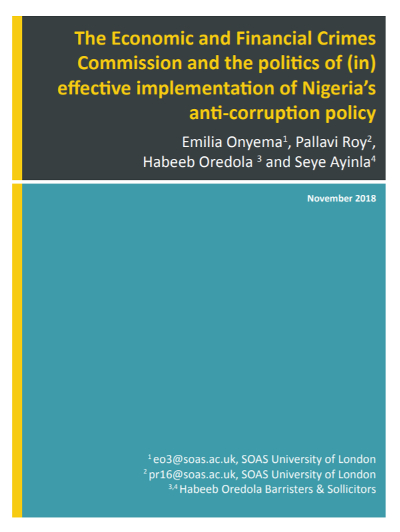
Publication Type: Working Paper
Countries: Nigeria
Authors: Emilia Onyema, Pallavi Roy, Habeeb Oredola, Seye Ayinla
Publication date: November 2018
Keywords: Agencies
The Economic and Financial Crimes Commission of Nigeria has been one of the more vocal – and at times controversial – anti-corruption agencies in Africa. This Working Paper seeks to analyse the effectiveness of the EFCC in isolating itself from damaging political influence, and examines the coordinative character of the Nigerian anti-corruption eco-system.
The EFCC has been instrumental in charging and prosecuting senior political leaders and businessmen with political links, as well as in recovering and repatriating significant stolen resources that belong to the Nigerian state. Yet it is also subject to frequent political interference, which reduces its effectiveness and means that it is often seen as an arm of the incumbent government without an independent mandate.
This Working Paper is a collaboration between SOAS-ACE Research Director Pallavi Roy, SOAS Lecturer Emilia Onyema and Habeeb Oredola and Seye Ayinla of Habeeb Oredola Barristers & Solicitors. It seeks to ascertain how well the Commission has fared in the enforcement and prosecution of economic and financial crimes, which is the primary purpose of ACAs such as the EFCC. We have done this by tabulating the numbers of petitions received, rejected and investigated, as well as eventual arrests and prosecutions (and their ratios) against successful convictions. Although comprehensive data on these activities is scarce, our analysis provides an indication of trends for more detailed investigations.
While procedural and political considerations currently limit the effectiveness of the EFCC, measures could be put in place to nudge the organisation in the right direction.

